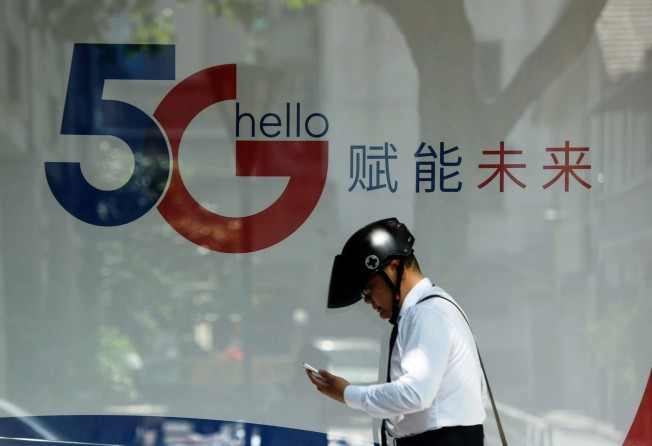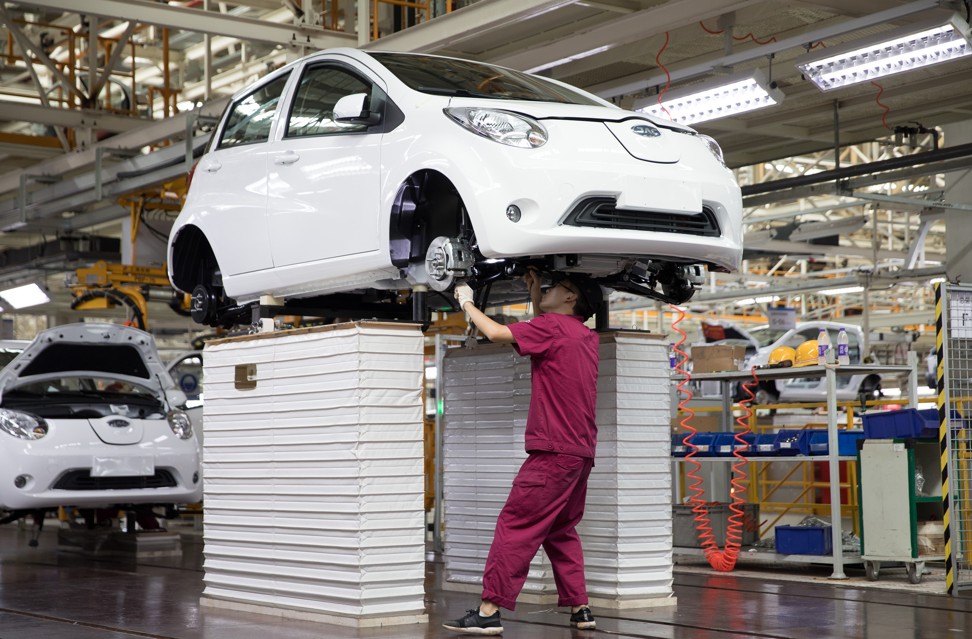China unveils 5G and NEV spending action plan to boost consumption to cushion US trade war impact
- Plan would aim to boost the sales of cars, home appliances and consumer electronics including 5G smartphones after sharp drop in retail sales in April
- Restrictions on car registrations would also be relaxed after sales dropped 14.6 per cent in April from a year earlier

China has released a two-year action plan to promote the purchase of consumer goods from new energy vehicles to 5G handsets in the latest move to offset the escalating trade war with the United States that continues to hit the world’s second largest economy.
In a joint circular published on Thursday, the National Development and Reform Commission (NDRC), the Ministry of Commerce and the environment protection ministry vowed to promote the upgrading and recycling of cars, home appliances, consumer electronics and other products.
“We will continue to optimise the consumption environment and improve recycling to release the growth potential of domestic demand. We will further upgrade key consumer goods to promote a strong domestic market,” the plan stated.
Smart cars and green home appliances are also on the list as Beijing pins its hopes on its large domestic market of nearly 1.4 billion consumers to absorb the impact from the protracted trade war with US after China’s export prospects darkened after US President Donald Trump more than doubled the tariffs on US$200 billion of Chinese imports from May 10.
A full-fledged trade war with the US, which would involve the US placing import levies on the remaining US$300 billion worth of Chinese products not already subject to tariffs, could knock at least 1 percentage point off China’s headline growth this year, Wang Yang, a member of the Politburo Standing Committee, told Taiwanese businessmen last month.
The International Monetary Fund this week lowered its China growth forecast for 2019 by 0.1 percentage point to 6.2 per cent.
Consumer spending is critical for China’s growth with NDRC data showing that consumption contributed to 65.1 per cent of economic growth in the first quarter of 2019, compared to 12.1 per cent for investment and 22.8 per cent for net exports.
Retails sales, a barometer of consumer spending in China, grew by only 7.2 per cent in April, sharply lower than March’s level of 8.7 per cent and 8.2 per cent for 2018, according to China’s official data. Car sales also dropped 14.6 per cent in April from a year earlier, extending the fall seen since last summer.
The new [government] measures will partly offset the decline in areas like automobiles, but a rapid rebound [in consumer spending] is unlikely
“The new [government] measures will partly offset the decline in areas like automobiles, but a rapid rebound [in consumer spending] is unlikely,” said Liu Xuezhi, a senior researcher with the Bank of Communications in Shanghai.
The government could announce additional support policies to boost consumption, Liu said, but Beijing would be unable to engineer a spending spree as it did a decade ago because household income is unlikely to rise quickly amid a slowing economy.
The latest circular on consumption upgrades came after the government ordered larger cities to remove car purchase limits which they had imposed to reduce congestion and pollution. The move comes amid speculation that the government will offer more cash subsidies for the purchases of new cars and household appliances.

Last weekend, Guangzhou increased its car purchase quota by 100,000 units over the next two years, while Shenzhen raised its annual quota by 40,000 units.
However, other cities like Beijing, which capped the annual number plate increase at 100,000, have not yet followed suit.
The Chinese government is also moving to boost both consumption and investment by upgrading its telecommunications network to 5G earlier than expected, with the Ministry of Industry and Information Technology granting four licences to domestic operators on Thursday.